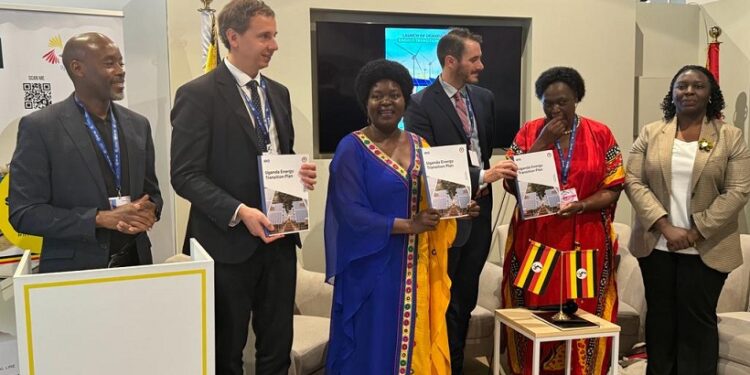The Ugandan government’s unveiling of the Energy Transition Plan at COP28 marks a groundbreaking initiative poised to revolutionize Uganda’s energy landscape.
This strategic move aims to position the East African nation as energy-secure, environmentally responsible, and highly attractive for private sector investments.
While making her keynote address at the COP28 on Tuesday in Dubai, the Minister of Energy and Mineral Development Ruth Nankabirwa noted that Uganda is among the fastest-growing countries in Africa. Therefore, maintaining this growth would amount to an economic transformation for the country.
She emphasized that Uganda’s Energy systems had to modernise and expand rapidly to meet these ambitions a move that has prompted Uganda to call for the development of its Energy Transition Plan (ETP).
As per Nankabirwa, the plan, inaugurated in Dubai through collaboration between the International Energy Agency and Uganda’s Ministry of Energy and Mineral Development, outlines an ambitious yet practical roadmap. It aims to fulfil the country’s growth and development goals in a secure, affordable, and sustainable manner.
“Given Uganda’s point of departure, progress on expanding energy infrastructure must kick up a notch. Electricity and clean cooking access rates will have to increase significantly. Fortunately, Uganda has an enormous amount of domestic resources that can help realise the transition. Uganda has ample potential for solar, hydroelectric, and geothermal power. With the opening of Tilenga and Kingfisher oil fields in 2025, Uganda is set to become an oil producer and exporter for the first time in its history. These resources, will reinforce the transition and contribute to Uganda’s economic growth,” she said.
She noted that Uganda’s rate of progress to reach universal access is steep, but not unprecedented. Reaching universal access in this decade relies on all solutions available.
“Attaining universal energy access will yield substantial development, health, and gender equity benefits. By 2025, Uganda is poised to become an oil producer for the first time in its history. With the energy transition plan, our focus has been on diligently reducing methane emissions from Uganda’s oil infrastructure, aiming to halve emissions per barrel, significantly undercutting current global averages,” she highlighted.
Nankabirwa disclosed that the Energy Transition Plan forms the foundation for Uganda’s aspirations toward achieving net-zero status. Highlighting its significance, she mentioned that within this plan, Uganda fulfils its Nationally Determined Contribution to the Paris Agreement by 2030 and anticipates a peak in energy-sector emissions by around 2040. Uganda’s ultimate goal is to attain net zero emissions in the energy sector by 2065.
However, the implementation of the new plan requires greater domestic and international effort. “Annual energy investment needs to climb to USD 5.7 billion by the end of this decade, with USD 850 million needed annually this decade to reach universal access. Realizing this sharp uptick in investment requires greater support from the international community and concentrated efforts to involve private sector finance.”
The minister also revealed that public-private partnerships will be instrumental in realizing the goals of the EPT. “We will identify critical sectors and projects that can benefit from such collaborations, designing financing structures that serve our nation’s interests and those of the investing partners.”
However, the EPT has come in place has found Uganda a leading pioneering in advocating to use of a clean renewable energy mix with 95 per cent of its current 2GW generation capacity provided by hydro and solar.
With survey data showing better solar potential in Uganda than Spain, currently a global leader in the solar sector, Uganda plans to drive up generation to 52GW by 2040, with more solar and hydro while simultaneously developing geothermal and nuclear
Therefore, for Uganda to become a regional hub for energy, able to export surplus electricity and refined petroleum products from the local oil refinery at the heart of the oil and gas sector project which is nearing maturity with the first oil scheduled in 2025. To reach universal electricity access by 2030 requires 800,000 households to be connected annually from today, a tough target but not unprecedented with India, Bangladesh, Kenya and Rwanda achieving similar connection rates in recent years.
Do you have a story in your community or an opinion to share with us: Email us at editorial@watchdoguganda.com













